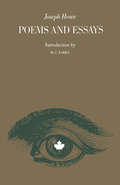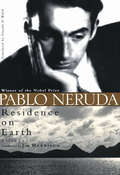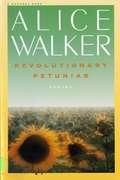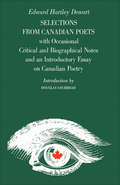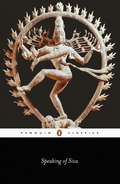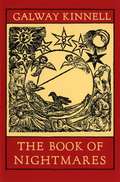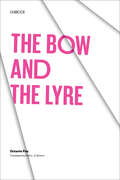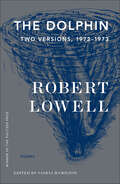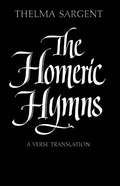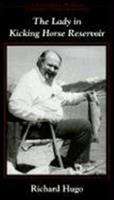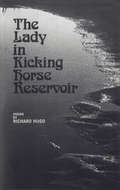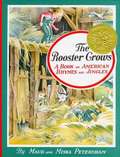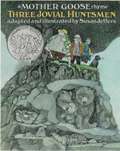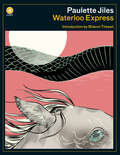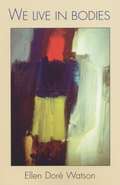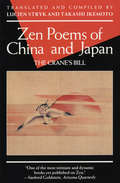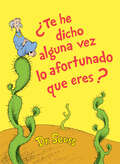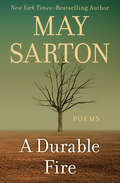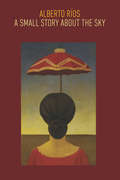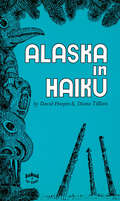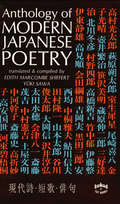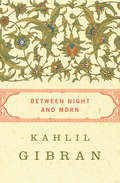- Table View
- List View
Poems and Essays
by Joseph Howe M. G. ParksThis volume, containing a selection of the poetry and prose of Joseph Howe, presents various aspects of a fascinating man who few Canadian know as other than the 'tribune of Nova Scotia' and a political giant of colonial times. Yet Howe was also a writer, and a good one. His intuitive grasp and pragmatic skill in political affairs were combined with wide-ranging intellectual curiosity, strong moral idealism, and a lively imagination. He revealed a vigorous strength in journalism and politics, in public life in general, and in his prose. His poetry admittedly was minor and colonial — he cultivated eighteenth-century verse models and habits of diction, which made him a second-generation Romantic in attitude and tone rather than in style — and its merit, according to David Munroe, Dalhousie Review, XX, 1941, 'lies principally in the deep sincerity which is characteristic of all good verse.' However, to understand the man and his times it is essential to understand the full extent of his endeavours; hence the significance of this book. The selections in this volume were assembled after Howe's death by his ninth child, Sydenham. They include the unfinished poem 'Acadia,' various serious and sentimental poems, five essays originally written and delivered as speeches, and a moral tale entitled 'The Locksmith of Philadelphia.'
Residence on Earth
by Pablo Neruda Jim Harrison Donald D. WalshNew Directions celebrates the Pablo Neruda Centennial. In celebration of the 100th anniversary of Pablo Neruda's birth, New Directions is pleased to announce the reissue of a classic work in a timeless translation by Donald D. Walsh and fully bilingual. Residence on Earth is perhaps Neruda's greatest work. Upon its publication in 1973, this bilingual publication instantly became "a revolution... a classic by which masterpieces are judged" (Review). "In Residence on Earth," wrote Amado Alonso, "the tornado of fury will no longer pass without lingering, because it will be identified with [Neruda's] heart."
Revolutionary Petunias and Other Poems
by Alice WalkerThese poems are about revolutionaries and lovers--about how, both in revolution and in love, loss of trust and compassion robs us of hope.
Selections from Canadian Poets: With Occasional Critical and Biographical Notes and an Introductory Essay on Canadian Poetry
by Douglas Lochhead Edward DewartSelections from Canadian Poets set an important precedent when it was published in 1864. It was the first anthology of native Canadian poetry and was compiled, as Edward Hartlet Dewart explained, in order to 'rescue from oblivion some of the floating pieces of Canadian authorship worthy of preservation in a more permanent form ...' This anthology, like any other, reflects the tastes of the anthologist and the tenor of the times. Pre-confederation poets had deeply felt ties with other countries from which developed a shared concern for what Douglas Lochhead terms in his introduction the 'now' and the 'place,' often described in terms of the 'past' and the 'other place,' which embraced a still larger loyalty – religious, political, philosophical, and above all nationalistic. Dewart was widely commended by critics of his attention for its endeavour to come to grips with the influences of other literatures (mainly English) and for its realization that so-called 'colonialism' was a major shaping force of Canadian poetry. On the first page of his essay Dewart states that: A national literature is an essential element in the formation of national character. These words, as well as his perceptive appraisal of the problems of Canadian literary endeavours, still apply today and make this reprint timely and pertinent.
Speaking of Siva
by A. K. RamanujanSpeaking of Siva is a selection of vacanas or free-verse sayings from the Virasaiva religious movement, dedicated to Siva as the supreme god. Written by four major saints, the greatest exponents of this poetic form, between the tenth and twelfth centuries, they are passionate lyrical expressions of the search for an unpredictable and spontaneous spiritual vision of 'now'. Here, yogic and tantric symbols, riddles and enigmas subvert the language of ordinary experience, as references to night and day, sex and family relationships take on new mystical meanings. These intense poems of personal devotion to a single deity also question traditional belief systems, customs, superstitions, image worship and even moral strictures, in verse that speaks to all men and women regardless of class and caste.
The Book of Nightmares
by Galway KinnellGalway Kinnell's poetry has always been marked by richness of language, devotion to the things and creatures of the world, and an effort to transform every understanding into the universality of art.
The Bow and the Lyre: The Poem, The Poetic Revelation, Poetry and History (Texas Pan American Series)
by Octavio PazOctavio Paz presents his sustained reflections on the poetic phenomenon and on the place of poetry in history and in our personal lives.
The Bow and the Lyre: The Poem. The Poetic Revelation. Poetry and History. (Texas Pan American Series)
by Octavio PazOctavio Paz presents his sustained reflections on the poetic phenomenon and on the place of poetry in history and in our personal lives.
The Dolphin: Two Versions, 1972–1973: Poems
by Robert LowellI have sat and listened to too manywords of the collaborating muse,and plotted perhaps too freely with my life,not avoiding injury to others,not avoiding injury to myself—to ask compassion . . . this book, half fiction,an eelnet made by man for the eel fightingmy eyes have seen what my hand did.Winner of the 1974 Pulitzer Prize in Poetry, The Dolphin was controversial from the beginning: many of the poems include the letters that Robert Lowell’s wife, the celebrated writer and critic Elizabeth Hardwick, wrote to him after he left her for the English socialite and writer Caroline Blackwood. He was warned by many, among them Elizabeth Bishop, that “art just isn’t worth that much.” Nevertheless, these poems are a powerful document of an impulsive love, and a moving record of Lowell’s change from one life and marriage in America to a new life on new terms with a new family in England, rendered with the stunning technical power and control for which he was so celebrated. This new edition, which follows the 1973 edition, includes scans of the pages of Lowell’s original manuscript, giving us a look into the brilliant and complicated mind of one of our most beloved and distinguished poets.
The Homeric Hymns: A Verse Translation
by Thelma SargentSpuriously attributed to Homer, the hymns and invocations collected in this book constitute, alongside The Iliad and The Odyssey the great sources of ancient Greek poetry. Now Thelma Sargent has rendered these works into a lucid and beautiful English verse. Accompanying the translated texts is a discussion of Greek meter and a explanation written by Sargent of her translation.
The Lady in Kicking Horse Reservoir
by Richard HugoThe collection includes "Montgomery Hollow," the title poem, and the famous, "Degrees of Gray in Philipsburg," in which he turns to the reader, midway through his description of a dying town, and says, "Isn't this your life? That ancient kiss/ still burning out your eyes? Isn't this defeat/ so accurate, the church bell simply seems/ a pure announcement: ring and no one comes?" His 1973 book, The Lady in Kicking Horse Reservoir, is both about Montana and not about Montana. Of his method, Hugo once said: "Usually I find a poem is triggered by something, a small town or abandoned house, that I feel others would ignore." The poems in The Lady in Kicking House Reservoir are tied to place and landscape, but Hugo's real subject matter remains elusive. From the book jacket: Richard Hugo (1923-1982) was born and raised in White Center, Washington. He flew thirty-three missions in Europe as a bombardier in World War II, receiving the Distinguished Flying Cross. He returned to Seattle to study with Theodore Roethke at the Writing Program. Nominated for the National Book Award. From 1977 to the end of his life, Hugo served as the judge of the Yale Series of Younger Poets competition. Upon publication of The Lady in Kicking Horse Reservoir in 1973, Richard Howard wrote, "Richard Hugo's concern is the unenviable, the unvisited, even the uninviting, which he must invest with his own deprivation, his own private war.... Each poem adds its incisive particulars to the general stoic wreck; but what startles, then reassures in all this canon of the inconsolable, the unsanctified, the dispossessed, is Hugo's poetics, the analogy of language to experience. . . . Richard Hugo is such an important poet because the difficulties inherent in his art provide him a means of saying what he has to say. It is no accident that he must develop a negative in order to produce a true image."
The Lady in Kicking Horse Reservoir: Poems
by Richard Hugo"Richard Hugo's concern is the unenviable, the unvisited, even the uninviting, which he must invest with his own deprivations, his own private war. The distinctiveness of impulse int he language, the movement organized in single syllables by the craving mind, this credible richness is related to, is even derived from, the poverty of the places, local emanations, free (or freed) to be the poet's own." --Richard Howard "Richard Hugo is such an important poet because the difficulties inherent in his art provide him a means of saying what he has to say. It is no accident that he must develop a negative in order to produce a true image." --Richard Howard
The Rooster Crows
by Miska Petersham Maud PetershamIncludes well-known nursery rhymes, counting-out games, skipping-rope songs, finger games, and other jingles, such as: "The rooster crows and away he goes", "Mother, may I go out to swim", "Fuzzy Wuzzy was a bear", and "Roses are red, violets are blue". An American Mother Goose for every child's library, it contains verses from collections all over America, beloved by children for generations and beautifully and charmingly illustrated by famous artists.
Three Jovial Huntsmen
by Susan JeffersDespite the many animals in the forest, three hunters see only a ship, a house, and a pincushion and find nothing to shoot.
Waterloo Express (A List)
by Paulette JilesThe remarkable debut poetry collection from renowned bestselling novelist and Award–winning poet Paulette Jiles, reissued in a handsome A List edition.Originally published in 1973, Paulette Jiles’s first collection amazed audiences with its rare depth of texture and verbal dexterity. Her work moves through landscapes that range from Africa to Mexico to Toronto with the ease of a travelling magician. Her swift, intricate metaphors leave the reader breathless, but her work also manages to be straight, earthy, vernacular, and disturbingly perceptive.
We Live in Bodies
by Ellen Doré Watson"You will close this book exhilarated by its quirky, passionate poems and grateful for its huge heart fired and fed by a prodigious imagination. This is brilliant, urgent work."--Thomas Lux
Zen Poems of China and Japan: The Crane's Bill
by Lucien Stryk“Excellent . . . A fine introduction to Chinese and Japanese Zen poetry for all readers” from the editors of Zen Poetry: Let the Spring Breeze Enter (Choice). Capturing in verse the ageless spirit of Zen, these 150 poems reflect the insight of famed masters from the ninth century to the nineteenth. The translators, in collaboration with Zen Master Taigan Takayama, have furnished illuminating commentary on the poems and arranged them as to facilitate comparison between the Chinese and Japanese Zen traditions. The poems themselves, rendered in clear and powerful English, offer a unique approach to Zen Buddhism, “compared with which,” as Lucien Stryk writes, “the many disquisitions on its meaning are as dust to living earth. We see in these poems, as in all important religious art, East or West, revelations of spiritual truths touched by a kind of divinity.” “One of the most intimate and dynamic books yet published on Zen.” —Sanford Goldstein, Arizona Quarterly
¿Te he dicho alguna vez lo afortunado que eres? (Classic Seuss)
by Dr. Seuss¡Edición en español y rimada del clásico de Dr. Seuss acerca del optimismo! Si crees que todo va mal,si estás triste o amargado,si te empiezas a enojar…,¡debes hacer lo que yo hago! Así comienza el magnífico consejo que le da un viejo sabio a un joven en este admirado álbum ilustrado de Dr. Seuss. Una divertida historia que nos enseña una lección acerca del pensamiento positivo, el antídoto perfecto para lectores de todas las edades que se sienten deprimidos o bajos de ánimo. ¡Gracias a las características rimas de Dr. Seuss y sus singulares ilustraciones, los lectores, sin lugar a duda, se darán cuenta de lo afortunados que en realidad son!Las ediciones rimadas y en español de los clásicos de Dr. Seuss publicadas por Random House brindan la maravillosa oportunidad de disfrutar de sus historias a más de treinta y ocho millones de personas hispanohablantes en Estados Unidos. A rhymed Spanish edition of Dr. Seuss's classic story about optimism!When you think things are bad,when you feel sour and blue,when you start to get mad . . .you should do what I do!So begins the terrific advice spoken by a wise old man to a young boy in this beloved picture book by Dr. Seuss. A funny story that teaches a valuable lesson about positive thinking, its the perfect antidote for readers of all ages who are feeling a bit down in the dumps. Thanks to Dr. Seuss's trademark rhymes and signature illustrations, readers will—no doubt—see just how lucky they truly are!Random House's rhymed Spanish-language editions of classic Dr. Seuss books make the joyful experience of reading Dr. Seuss books available for the more than 38 million people in the United States who speak Spanish.
A Durable Fire: Poems
by May SartonPoetic meditations on solitude by acclaimed author May SartonThis collection borrows its title from Sir Walter Raleigh, who wrote, &“Love is a durable fire / In the mind ever burning.&” It is a fitting sentiment for a collection on solitude, wherein the author finds herself full of emotion even in seclusion. The first poem, &“Gestalt at Sixty,&” finds the author reflecting on the joy and loneliness of being solitary. A Durable Fire is a transformative work by a masterful poet.
A Durable Fire: Poems
by May SartonPoetic meditations on solitude by acclaimed author May SartonThis collection borrows its title from Sir Walter Raleigh, who wrote, &“Love is a durable fire / In the mind ever burning.&” It is a fitting sentiment for a collection on solitude, wherein the author finds herself full of emotion even in seclusion. The first poem, &“Gestalt at Sixty,&” finds the author reflecting on the joy and loneliness of being solitary. A Durable Fire is a transformative work by a masterful poet.
A Small Story about the Sky
by Alberto Ríos"Rios evokes the mysterious and unexpected forces that dwell inside the familiar."-The Washington Post"Ríos delivers another stunning book of poems, rich in impeccable metaphors, that revel in the ordinariness of morning coffee and the crackle of thunderous desert storms. In one sonnet, Ríos addresses injustice in the borderlands, capturing with mathematical precision the everyday struggles that many migrants face-'The border is an equation in search of an equals sign.' A series of sonnets about desert flora abounds with fantastic, magical imagery-'Bougainvilleas do not bloom-they bleed' and 'Apricots are eggs laid in trees by invisible golden hens.' Likewise, Ríos's bestiary sonnets overflow with inimitable similes, worthy of a book unto themselves-'Minnows are where a river's leg has fallen asleep' and 'Gnats are sneezes still flying around.' This robust volume is the perfect place to start for readers new to Ríos and a prize for seasoned fans."-BooklistIn his thirteenth book, Alberto Rios casts an intense desert light on the rich stories unfolding along the Mexico-US border. Peppered with Spanish and touches of magical realism, ordinary life and its simple props-morning showers, spilled birdseed, winter lemons-becomes an exploration of mortality and humanity, and the many possibilities of how lives might yet be lived.Mad HoneyMade from magnificent rhododendron, poisonous rhododendron,Very difficult-to-pronounce rhododendron-whateverRhododendron even is-I would have to look it up myself,This word sounding puffed up, peacocky with itsIndianapolisly-long spelling, all those letters moving in and out.But the plant itself, the plant and the bees that find it:The bees see in its purple flower, first, a purple flower.They do not spell it. They do not live in fear of quizzes,Purple offering what it has to offer, unapologetic, without furtherDefinition, purple irresistible to the artist's and to the bee's eye-Who can blame either one this first-grade impulse toward love?Purple, always wearing something low-cut . . . Alberto Rios is the Poet Laureate of Arizona and host of the PBS program Books & Co. He was a finalist for the National Book Award for his poetry volume The Smallest Muscle in the Human Body. He teaches at Arizona State University and lives in Chandler, Arizona.
Alaska in Haiku
by Diana Rystbaek Tillion David Townsend HoopesAlaska in Haiku is the flower of the authors' affectionate observation of life in Alaska and if their love of poetry. Sharing an interest in this shortest of all forms of poetry, they found haiku a most gratifying medium to work in. The winter moon-light-- The Shadow of the totem pole,Shadow of the spruce.The reader is invited to follow Mrs. Tillion and Dr. Hoopes through the four seasons and share their delight in Alaska. The pleasing images, highlighted by delicate drawings show nature and life in a hopeful, reassuring mood.
Anthology of Modern Japanese Poetry
by Yuki Sawa Edith Marcombe ShiffertThe state of Japanese poetry in the twentieth century, its high quality and individuality is clearly shown in this book. The introduction gives a brief,lucid history of poetry in Japan, with the emphasis on modern poetry. The body of the book is taken up with the translation of the work of forty-nine widely acclaimed poets: free-verse poets, tanka poets, and haiku poets. At the back are notes giving illuminating biographical and literary information about each poet.The excellence of the translations and the lucidity of the introduction and notes make the book a treasure for poetry lovers everywhere .
Between Night and Morn
by Kahlil GibranA selection of early works by bestselling author Kahlil Gibran offers an accessible introduction to his beautiful language and inspiring worldview The prolific writings of Kahlil Gibran, author of The Prophet, continue to inspire a devoted international following and have transformed modern Arabic literature. In this volume of early writings, Gibran&’s simple yet lyrical style crosses from prose to poetry and yields insight into his dedication and inner vision of beauty, including the tale of a strange hermit in &“The Tempest,&” the discovery of love lost to war in &“The Mermaids,&” and the long voyage of sea and soul in the prose poem &“Between Night and Morn.&” From scathing indictments against worldly wrongs to tender spiritual exultations, Between Night and Morn powerfully evokes the mood and magnetism of Gibran.
